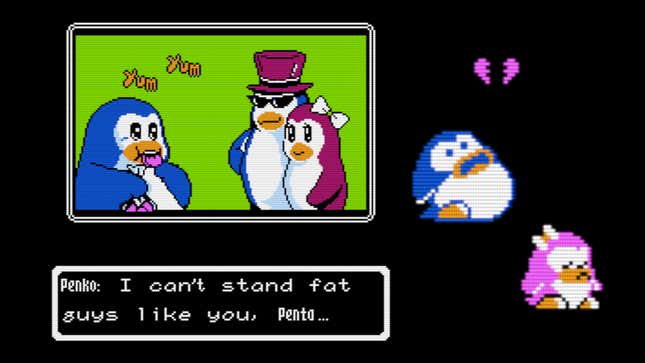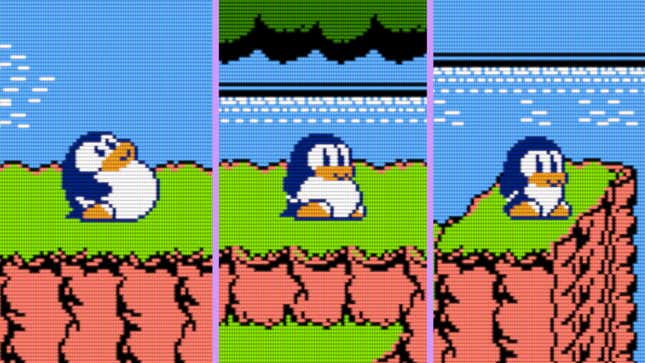
On its surface, Yume Penguin Monogatari seems like a standard, early ‘90s NES platformer. It features a lovable hero, colorful environments, and a catchy, chiptune soundtrack from the old masters at Konami. But beneath all that, this classic side-scroller is also so bluntly, nakedly fatphobic that I couldn’t help but laugh my way through its half-dozen levels.
Yume Penguin Monogatari—roughly “Dream Penguin Story”—was released for Japan’s Famicom in early 1991. It stars a cute, blue penguin named Penta who, after appearances in earlier Konami games like Antarctic Adventure and Penguin Adventure, was considered something of a company mascot. He even has lore that connects him to shoot ‘em up franchise Parodius; the penguin in that series, Pentarou, is apparently Penta’s son, but I digress.
Yume Penguin Monogatari opens with Penta’s girlfriend Penko chiding him for his weight as he happily wolfs down a huge bag of candy.
“I can’t stand fat guys like you, Penta, so I’ve decided to go on a date with the smart, stylish Ginji instead.” Penko says, as per the 2006 fan translation. “If you really love me, come see me when you’ve slimmed up!”
Ginji, you see, wears a fuchsia top hat and dark sunglasses, which is apparently the height of fashion in the penguin world. Dude’s some real hot shit in Antarctic social circles.
Thus begins Penta’s adventure. After this short cutscene, Yume Penguin Monogatari introduces you to its main gameplay idea, which revolves entirely around a meter that charts Penta’s weight. Getting hit by enemies or eating their tasty, food-based projectiles increases the penguin’s mass, whereas drinking “diet” drinks scattered around the level and dropped by defeated opponents trims him down.
While Penta becomes slower and harder to maneuver as he grows in girth, he also has different attacks depending on his size. At his fattest, Penta can only belly flop onto enemies, but as he thins out, he also gains access to kicks and even his own projectiles for long-range offense. This extends into the game’s horizontal shooter segments as well, with Penta’s airplane gaining better weaponry when he loses weight.
At stage’s end, he calls up Penko, who issues a judgment based on how much weight her would-be paramour has lost. Fail to reach a certain level of thinness and she’ll reject him outright, resulting in a game over. This isn’t a huge deal in the first five levels, merely sending you back to the beginning of the stage. But missing your weigh-in after the final level means starting the game over entirely.

As someone whose flesh prison has wavered between Husky and Hefty for most of my life, I should probably be more offended by Yume Penguin Monogatari than I am. Its overall message that no one will love you if your weight’s above a certain number is close-minded, cruel, and potentially even harmful to more impressionable players. But the way the game delivers that message is just so over the top that I find it hard to get too mad.
Yume Penguin Monogatari is a relic of a bygone era, both shocking and charming in equal measure. Sure, it probably shouldn’t have gotten the green light, even in the less enlightened atmosphere of the early ‘90s, but watching a cartoon penguin belly flop hapless enemies after accidentally scarfing down too many sweets is just so delightful. If the game had removed the segments where Penko treats Penta like shit, this could have been just as fun of an adventure without all the weird shame-y bits.
Penta, my penguin friend, no one should blame you for packing on a few pounds, especially in the chilly Antarctic. Thicc or thin, you’re an adorable little guy.

